How Brexit Will Impact the UK Economy: An Economic Analysis Report
VerifiedAdded on 2023/01/16
|13
|4261
|20
Report
AI Summary
This report investigates the economic impacts of Brexit on the United Kingdom, examining both positive and negative outcomes predicted by economists. It analyzes the uncertainty caused by the UK's departure from the European Union, the trade deals, and the impact on various sectors. The research employs both quantitative and qualitative methods to analyze the effects on the UK economy, considering factors like consumer spending, trade relationships, financial services, and the depreciation of the sterling pound. The report reviews the literature, discussing arguments for and against Brexit, and concludes that while there may be potential benefits, the negative economic impacts, such as trade and migration barriers, are likely to outweigh the positives.
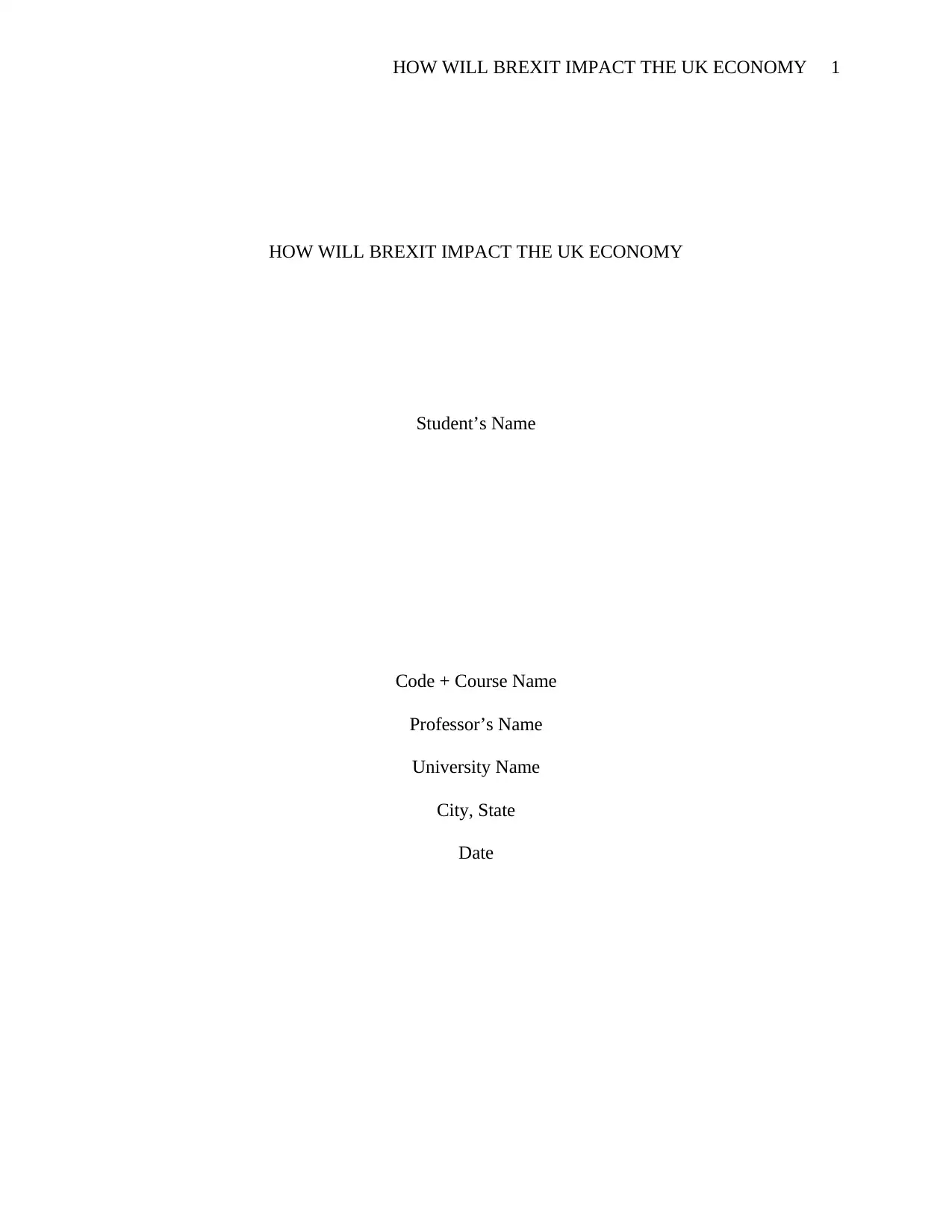
HOW WILL BREXIT IMPACT THE UK ECONOMY 1
HOW WILL BREXIT IMPACT THE UK ECONOMY
Student’s Name
Code + Course Name
Professor’s Name
University Name
City, State
Date
HOW WILL BREXIT IMPACT THE UK ECONOMY
Student’s Name
Code + Course Name
Professor’s Name
University Name
City, State
Date
Paraphrase This Document
Need a fresh take? Get an instant paraphrase of this document with our AI Paraphraser
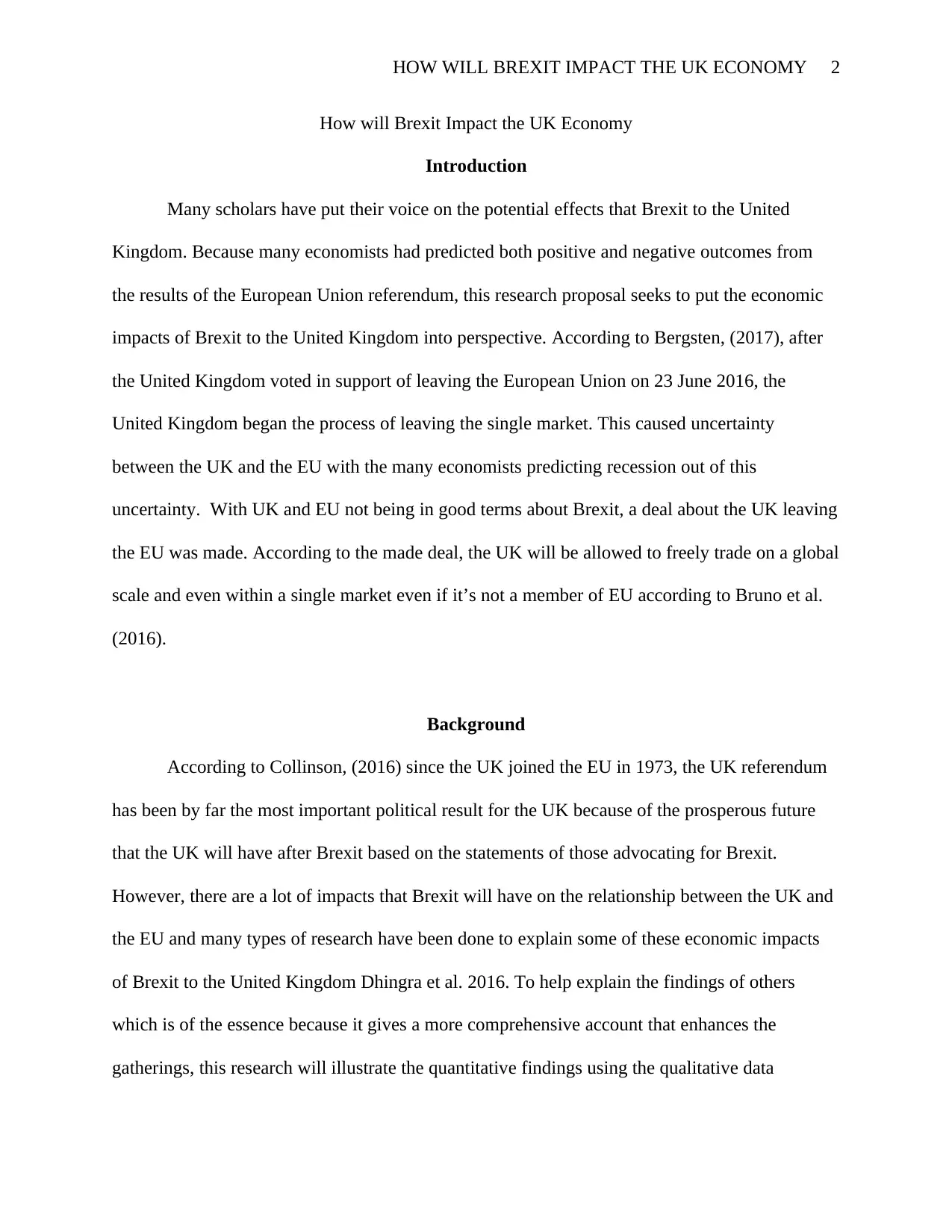
HOW WILL BREXIT IMPACT THE UK ECONOMY 2
How will Brexit Impact the UK Economy
Introduction
Many scholars have put their voice on the potential effects that Brexit to the United
Kingdom. Because many economists had predicted both positive and negative outcomes from
the results of the European Union referendum, this research proposal seeks to put the economic
impacts of Brexit to the United Kingdom into perspective. According to Bergsten, (2017), after
the United Kingdom voted in support of leaving the European Union on 23 June 2016, the
United Kingdom began the process of leaving the single market. This caused uncertainty
between the UK and the EU with the many economists predicting recession out of this
uncertainty. With UK and EU not being in good terms about Brexit, a deal about the UK leaving
the EU was made. According to the made deal, the UK will be allowed to freely trade on a global
scale and even within a single market even if it’s not a member of EU according to Bruno et al.
(2016).
Background
According to Collinson, (2016) since the UK joined the EU in 1973, the UK referendum
has been by far the most important political result for the UK because of the prosperous future
that the UK will have after Brexit based on the statements of those advocating for Brexit.
However, there are a lot of impacts that Brexit will have on the relationship between the UK and
the EU and many types of research have been done to explain some of these economic impacts
of Brexit to the United Kingdom Dhingra et al. 2016. To help explain the findings of others
which is of the essence because it gives a more comprehensive account that enhances the
gatherings, this research will illustrate the quantitative findings using the qualitative data
How will Brexit Impact the UK Economy
Introduction
Many scholars have put their voice on the potential effects that Brexit to the United
Kingdom. Because many economists had predicted both positive and negative outcomes from
the results of the European Union referendum, this research proposal seeks to put the economic
impacts of Brexit to the United Kingdom into perspective. According to Bergsten, (2017), after
the United Kingdom voted in support of leaving the European Union on 23 June 2016, the
United Kingdom began the process of leaving the single market. This caused uncertainty
between the UK and the EU with the many economists predicting recession out of this
uncertainty. With UK and EU not being in good terms about Brexit, a deal about the UK leaving
the EU was made. According to the made deal, the UK will be allowed to freely trade on a global
scale and even within a single market even if it’s not a member of EU according to Bruno et al.
(2016).
Background
According to Collinson, (2016) since the UK joined the EU in 1973, the UK referendum
has been by far the most important political result for the UK because of the prosperous future
that the UK will have after Brexit based on the statements of those advocating for Brexit.
However, there are a lot of impacts that Brexit will have on the relationship between the UK and
the EU and many types of research have been done to explain some of these economic impacts
of Brexit to the United Kingdom Dhingra et al. 2016. To help explain the findings of others
which is of the essence because it gives a more comprehensive account that enhances the
gatherings, this research will illustrate the quantitative findings using the qualitative data
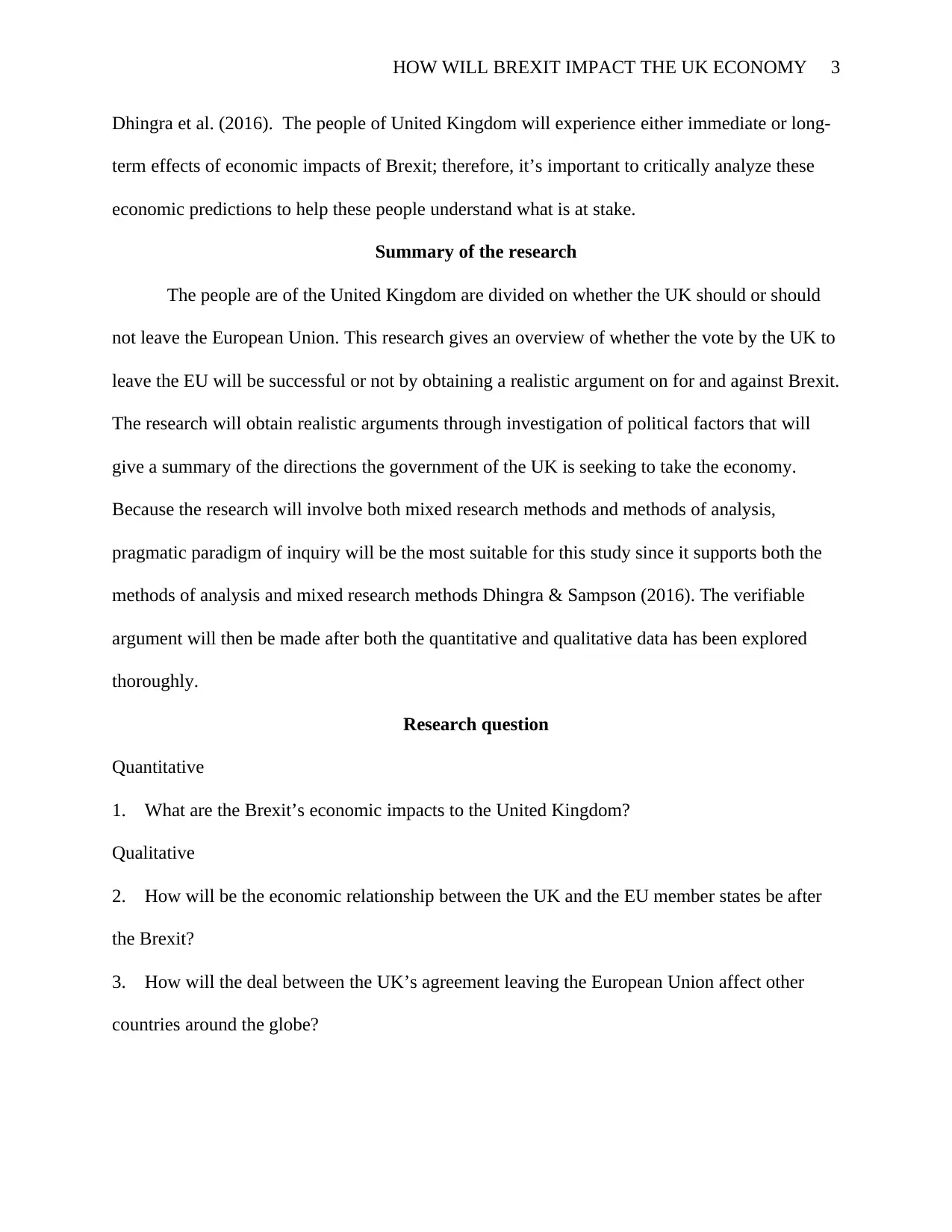
HOW WILL BREXIT IMPACT THE UK ECONOMY 3
Dhingra et al. (2016). The people of United Kingdom will experience either immediate or long-
term effects of economic impacts of Brexit; therefore, it’s important to critically analyze these
economic predictions to help these people understand what is at stake.
Summary of the research
The people are of the United Kingdom are divided on whether the UK should or should
not leave the European Union. This research gives an overview of whether the vote by the UK to
leave the EU will be successful or not by obtaining a realistic argument on for and against Brexit.
The research will obtain realistic arguments through investigation of political factors that will
give a summary of the directions the government of the UK is seeking to take the economy.
Because the research will involve both mixed research methods and methods of analysis,
pragmatic paradigm of inquiry will be the most suitable for this study since it supports both the
methods of analysis and mixed research methods Dhingra & Sampson (2016). The verifiable
argument will then be made after both the quantitative and qualitative data has been explored
thoroughly.
Research question
Quantitative
1. What are the Brexit’s economic impacts to the United Kingdom?
Qualitative
2. How will be the economic relationship between the UK and the EU member states be after
the Brexit?
3. How will the deal between the UK’s agreement leaving the European Union affect other
countries around the globe?
Dhingra et al. (2016). The people of United Kingdom will experience either immediate or long-
term effects of economic impacts of Brexit; therefore, it’s important to critically analyze these
economic predictions to help these people understand what is at stake.
Summary of the research
The people are of the United Kingdom are divided on whether the UK should or should
not leave the European Union. This research gives an overview of whether the vote by the UK to
leave the EU will be successful or not by obtaining a realistic argument on for and against Brexit.
The research will obtain realistic arguments through investigation of political factors that will
give a summary of the directions the government of the UK is seeking to take the economy.
Because the research will involve both mixed research methods and methods of analysis,
pragmatic paradigm of inquiry will be the most suitable for this study since it supports both the
methods of analysis and mixed research methods Dhingra & Sampson (2016). The verifiable
argument will then be made after both the quantitative and qualitative data has been explored
thoroughly.
Research question
Quantitative
1. What are the Brexit’s economic impacts to the United Kingdom?
Qualitative
2. How will be the economic relationship between the UK and the EU member states be after
the Brexit?
3. How will the deal between the UK’s agreement leaving the European Union affect other
countries around the globe?
⊘ This is a preview!⊘
Do you want full access?
Subscribe today to unlock all pages.

Trusted by 1+ million students worldwide
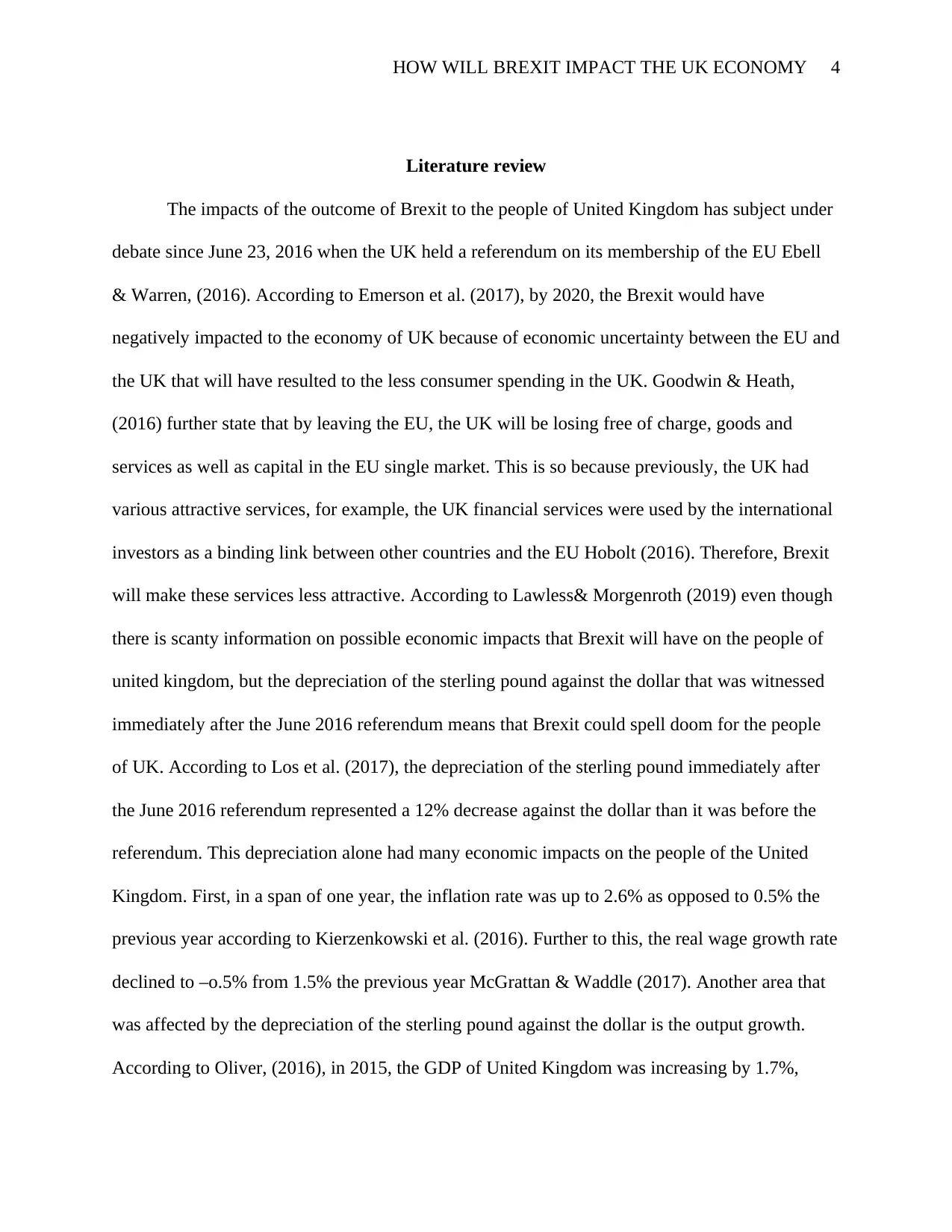
HOW WILL BREXIT IMPACT THE UK ECONOMY 4
Literature review
The impacts of the outcome of Brexit to the people of United Kingdom has subject under
debate since June 23, 2016 when the UK held a referendum on its membership of the EU Ebell
& Warren, (2016). According to Emerson et al. (2017), by 2020, the Brexit would have
negatively impacted to the economy of UK because of economic uncertainty between the EU and
the UK that will have resulted to the less consumer spending in the UK. Goodwin & Heath,
(2016) further state that by leaving the EU, the UK will be losing free of charge, goods and
services as well as capital in the EU single market. This is so because previously, the UK had
various attractive services, for example, the UK financial services were used by the international
investors as a binding link between other countries and the EU Hobolt (2016). Therefore, Brexit
will make these services less attractive. According to Lawless& Morgenroth (2019) even though
there is scanty information on possible economic impacts that Brexit will have on the people of
united kingdom, but the depreciation of the sterling pound against the dollar that was witnessed
immediately after the June 2016 referendum means that Brexit could spell doom for the people
of UK. According to Los et al. (2017), the depreciation of the sterling pound immediately after
the June 2016 referendum represented a 12% decrease against the dollar than it was before the
referendum. This depreciation alone had many economic impacts on the people of the United
Kingdom. First, in a span of one year, the inflation rate was up to 2.6% as opposed to 0.5% the
previous year according to Kierzenkowski et al. (2016). Further to this, the real wage growth rate
declined to –o.5% from 1.5% the previous year McGrattan & Waddle (2017). Another area that
was affected by the depreciation of the sterling pound against the dollar is the output growth.
According to Oliver, (2016), in 2015, the GDP of United Kingdom was increasing by 1.7%,
Literature review
The impacts of the outcome of Brexit to the people of United Kingdom has subject under
debate since June 23, 2016 when the UK held a referendum on its membership of the EU Ebell
& Warren, (2016). According to Emerson et al. (2017), by 2020, the Brexit would have
negatively impacted to the economy of UK because of economic uncertainty between the EU and
the UK that will have resulted to the less consumer spending in the UK. Goodwin & Heath,
(2016) further state that by leaving the EU, the UK will be losing free of charge, goods and
services as well as capital in the EU single market. This is so because previously, the UK had
various attractive services, for example, the UK financial services were used by the international
investors as a binding link between other countries and the EU Hobolt (2016). Therefore, Brexit
will make these services less attractive. According to Lawless& Morgenroth (2019) even though
there is scanty information on possible economic impacts that Brexit will have on the people of
united kingdom, but the depreciation of the sterling pound against the dollar that was witnessed
immediately after the June 2016 referendum means that Brexit could spell doom for the people
of UK. According to Los et al. (2017), the depreciation of the sterling pound immediately after
the June 2016 referendum represented a 12% decrease against the dollar than it was before the
referendum. This depreciation alone had many economic impacts on the people of the United
Kingdom. First, in a span of one year, the inflation rate was up to 2.6% as opposed to 0.5% the
previous year according to Kierzenkowski et al. (2016). Further to this, the real wage growth rate
declined to –o.5% from 1.5% the previous year McGrattan & Waddle (2017). Another area that
was affected by the depreciation of the sterling pound against the dollar is the output growth.
According to Oliver, (2016), in 2015, the GDP of United Kingdom was increasing by 1.7%,
Paraphrase This Document
Need a fresh take? Get an instant paraphrase of this document with our AI Paraphraser
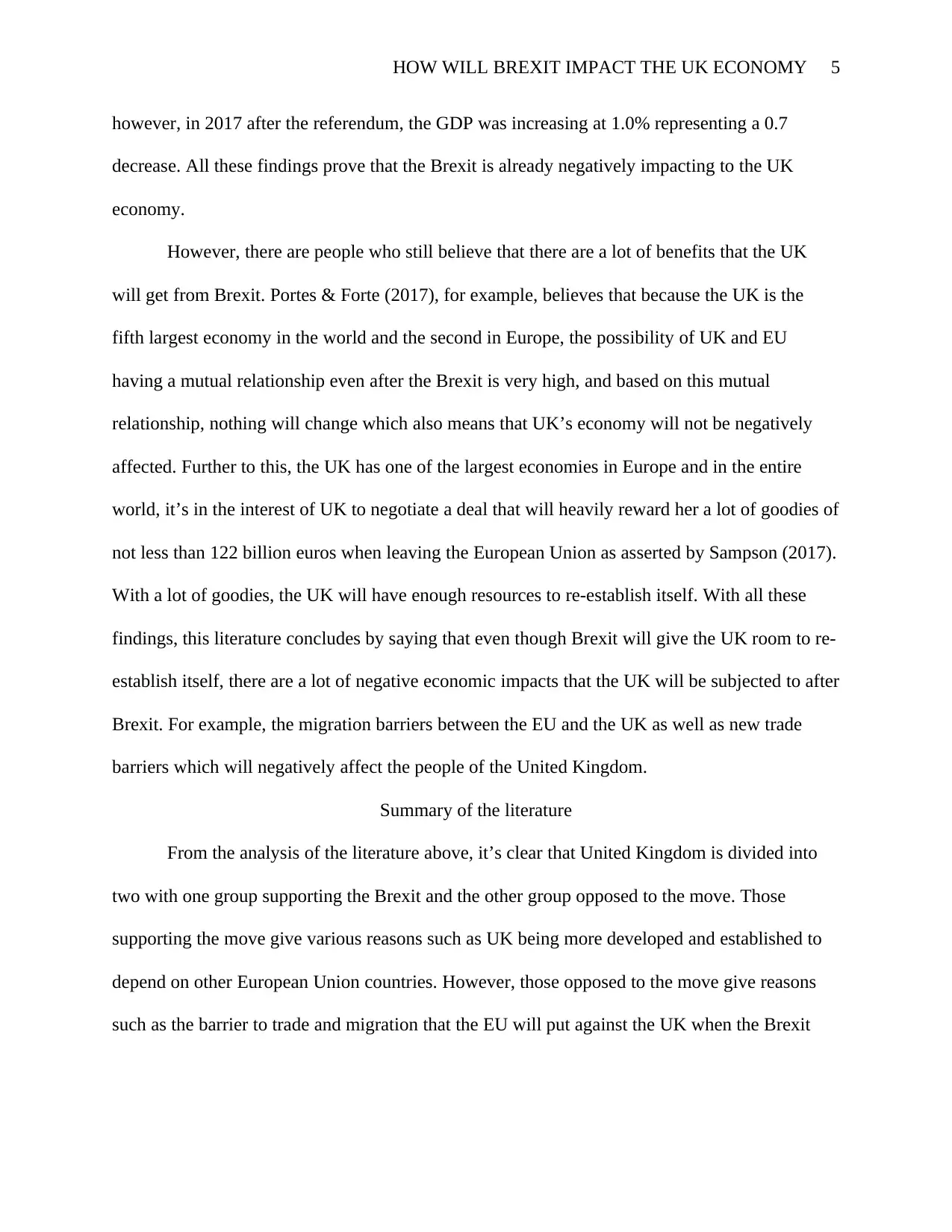
HOW WILL BREXIT IMPACT THE UK ECONOMY 5
however, in 2017 after the referendum, the GDP was increasing at 1.0% representing a 0.7
decrease. All these findings prove that the Brexit is already negatively impacting to the UK
economy.
However, there are people who still believe that there are a lot of benefits that the UK
will get from Brexit. Portes & Forte (2017), for example, believes that because the UK is the
fifth largest economy in the world and the second in Europe, the possibility of UK and EU
having a mutual relationship even after the Brexit is very high, and based on this mutual
relationship, nothing will change which also means that UK’s economy will not be negatively
affected. Further to this, the UK has one of the largest economies in Europe and in the entire
world, it’s in the interest of UK to negotiate a deal that will heavily reward her a lot of goodies of
not less than 122 billion euros when leaving the European Union as asserted by Sampson (2017).
With a lot of goodies, the UK will have enough resources to re-establish itself. With all these
findings, this literature concludes by saying that even though Brexit will give the UK room to re-
establish itself, there are a lot of negative economic impacts that the UK will be subjected to after
Brexit. For example, the migration barriers between the EU and the UK as well as new trade
barriers which will negatively affect the people of the United Kingdom.
Summary of the literature
From the analysis of the literature above, it’s clear that United Kingdom is divided into
two with one group supporting the Brexit and the other group opposed to the move. Those
supporting the move give various reasons such as UK being more developed and established to
depend on other European Union countries. However, those opposed to the move give reasons
such as the barrier to trade and migration that the EU will put against the UK when the Brexit
however, in 2017 after the referendum, the GDP was increasing at 1.0% representing a 0.7
decrease. All these findings prove that the Brexit is already negatively impacting to the UK
economy.
However, there are people who still believe that there are a lot of benefits that the UK
will get from Brexit. Portes & Forte (2017), for example, believes that because the UK is the
fifth largest economy in the world and the second in Europe, the possibility of UK and EU
having a mutual relationship even after the Brexit is very high, and based on this mutual
relationship, nothing will change which also means that UK’s economy will not be negatively
affected. Further to this, the UK has one of the largest economies in Europe and in the entire
world, it’s in the interest of UK to negotiate a deal that will heavily reward her a lot of goodies of
not less than 122 billion euros when leaving the European Union as asserted by Sampson (2017).
With a lot of goodies, the UK will have enough resources to re-establish itself. With all these
findings, this literature concludes by saying that even though Brexit will give the UK room to re-
establish itself, there are a lot of negative economic impacts that the UK will be subjected to after
Brexit. For example, the migration barriers between the EU and the UK as well as new trade
barriers which will negatively affect the people of the United Kingdom.
Summary of the literature
From the analysis of the literature above, it’s clear that United Kingdom is divided into
two with one group supporting the Brexit and the other group opposed to the move. Those
supporting the move give various reasons such as UK being more developed and established to
depend on other European Union countries. However, those opposed to the move give reasons
such as the barrier to trade and migration that the EU will put against the UK when the Brexit
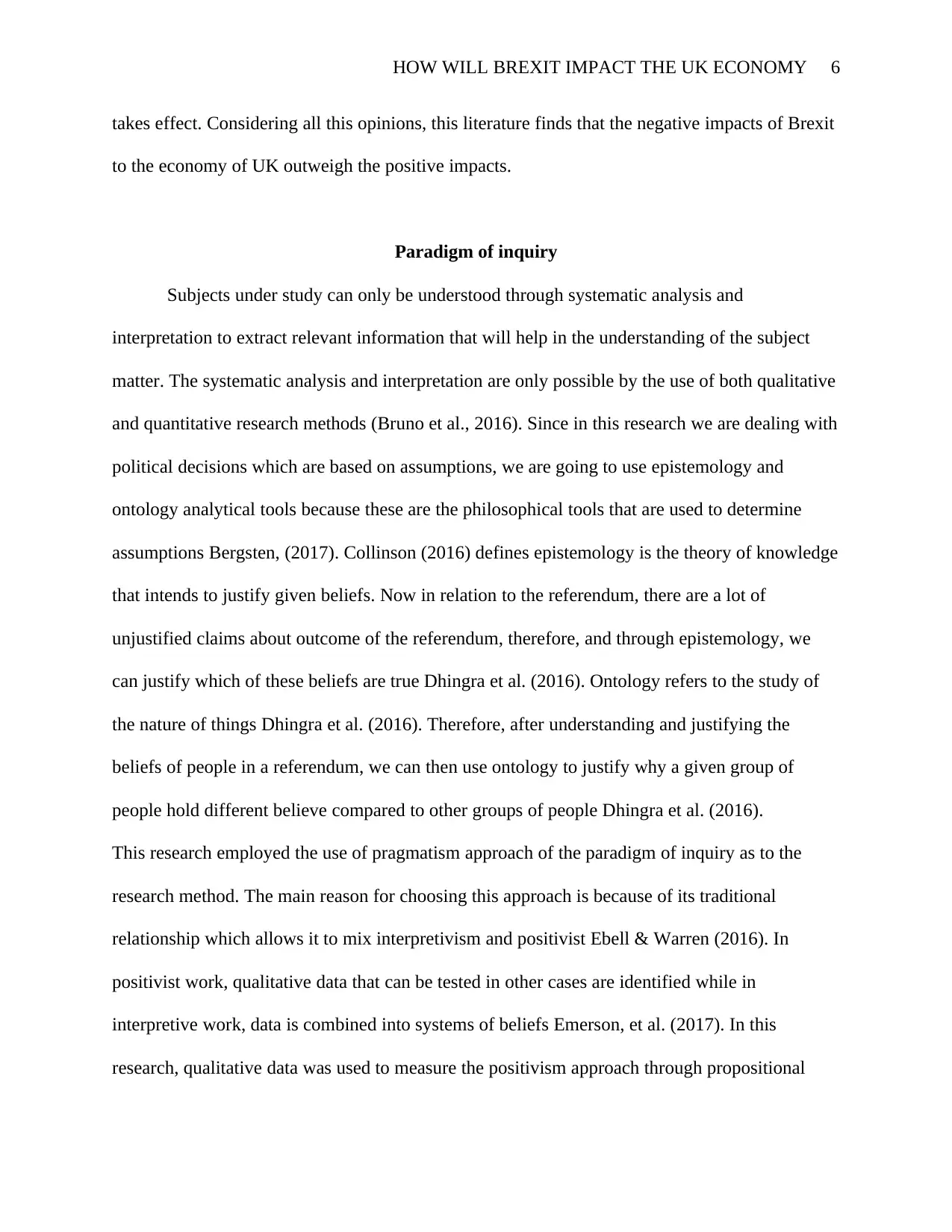
HOW WILL BREXIT IMPACT THE UK ECONOMY 6
takes effect. Considering all this opinions, this literature finds that the negative impacts of Brexit
to the economy of UK outweigh the positive impacts.
Paradigm of inquiry
Subjects under study can only be understood through systematic analysis and
interpretation to extract relevant information that will help in the understanding of the subject
matter. The systematic analysis and interpretation are only possible by the use of both qualitative
and quantitative research methods (Bruno et al., 2016). Since in this research we are dealing with
political decisions which are based on assumptions, we are going to use epistemology and
ontology analytical tools because these are the philosophical tools that are used to determine
assumptions Bergsten, (2017). Collinson (2016) defines epistemology is the theory of knowledge
that intends to justify given beliefs. Now in relation to the referendum, there are a lot of
unjustified claims about outcome of the referendum, therefore, and through epistemology, we
can justify which of these beliefs are true Dhingra et al. (2016). Ontology refers to the study of
the nature of things Dhingra et al. (2016). Therefore, after understanding and justifying the
beliefs of people in a referendum, we can then use ontology to justify why a given group of
people hold different believe compared to other groups of people Dhingra et al. (2016).
This research employed the use of pragmatism approach of the paradigm of inquiry as to the
research method. The main reason for choosing this approach is because of its traditional
relationship which allows it to mix interpretivism and positivist Ebell & Warren (2016). In
positivist work, qualitative data that can be tested in other cases are identified while in
interpretive work, data is combined into systems of beliefs Emerson, et al. (2017). In this
research, qualitative data was used to measure the positivism approach through propositional
takes effect. Considering all this opinions, this literature finds that the negative impacts of Brexit
to the economy of UK outweigh the positive impacts.
Paradigm of inquiry
Subjects under study can only be understood through systematic analysis and
interpretation to extract relevant information that will help in the understanding of the subject
matter. The systematic analysis and interpretation are only possible by the use of both qualitative
and quantitative research methods (Bruno et al., 2016). Since in this research we are dealing with
political decisions which are based on assumptions, we are going to use epistemology and
ontology analytical tools because these are the philosophical tools that are used to determine
assumptions Bergsten, (2017). Collinson (2016) defines epistemology is the theory of knowledge
that intends to justify given beliefs. Now in relation to the referendum, there are a lot of
unjustified claims about outcome of the referendum, therefore, and through epistemology, we
can justify which of these beliefs are true Dhingra et al. (2016). Ontology refers to the study of
the nature of things Dhingra et al. (2016). Therefore, after understanding and justifying the
beliefs of people in a referendum, we can then use ontology to justify why a given group of
people hold different believe compared to other groups of people Dhingra et al. (2016).
This research employed the use of pragmatism approach of the paradigm of inquiry as to the
research method. The main reason for choosing this approach is because of its traditional
relationship which allows it to mix interpretivism and positivist Ebell & Warren (2016). In
positivist work, qualitative data that can be tested in other cases are identified while in
interpretive work, data is combined into systems of beliefs Emerson, et al. (2017). In this
research, qualitative data was used to measure the positivism approach through propositional
⊘ This is a preview!⊘
Do you want full access?
Subscribe today to unlock all pages.

Trusted by 1+ million students worldwide
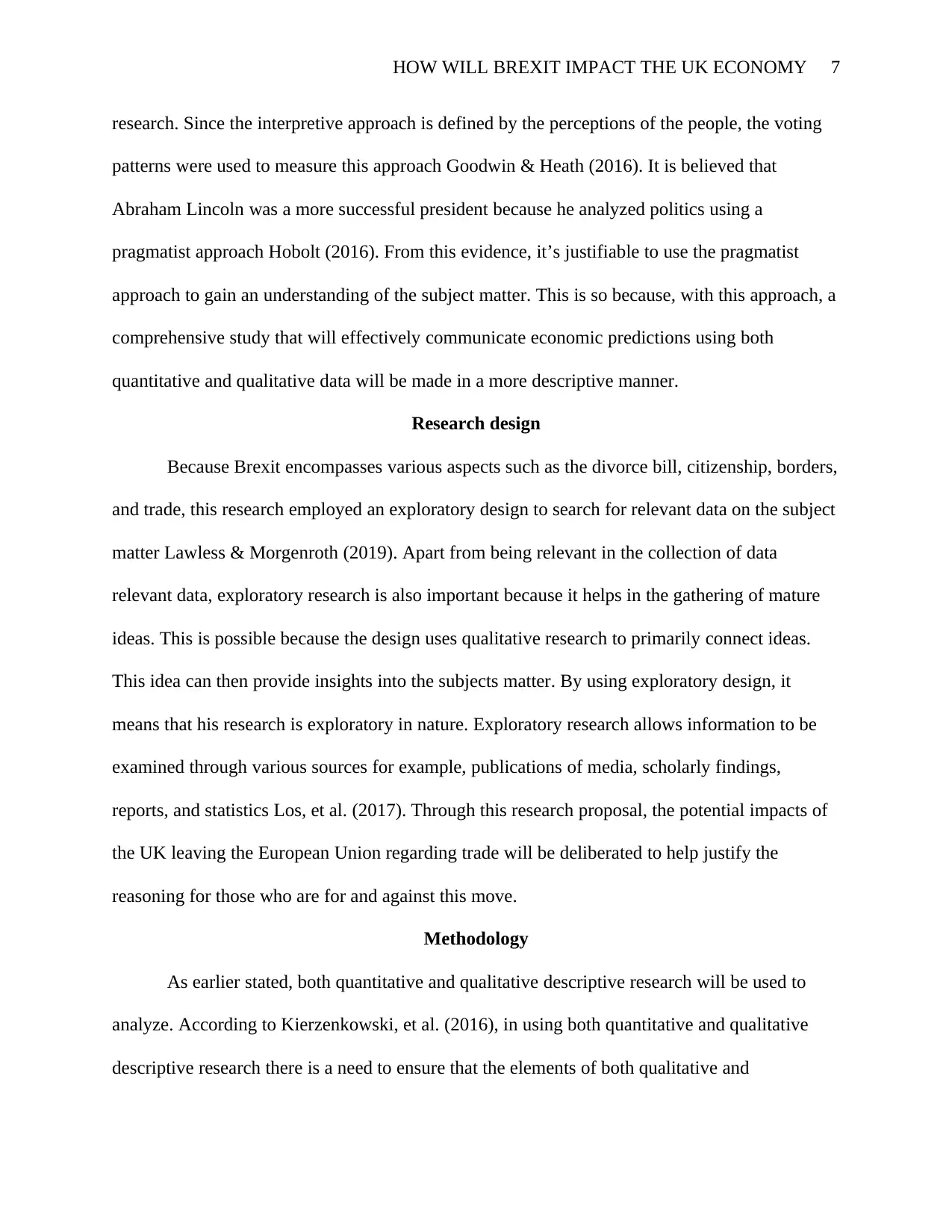
HOW WILL BREXIT IMPACT THE UK ECONOMY 7
research. Since the interpretive approach is defined by the perceptions of the people, the voting
patterns were used to measure this approach Goodwin & Heath (2016). It is believed that
Abraham Lincoln was a more successful president because he analyzed politics using a
pragmatist approach Hobolt (2016). From this evidence, it’s justifiable to use the pragmatist
approach to gain an understanding of the subject matter. This is so because, with this approach, a
comprehensive study that will effectively communicate economic predictions using both
quantitative and qualitative data will be made in a more descriptive manner.
Research design
Because Brexit encompasses various aspects such as the divorce bill, citizenship, borders,
and trade, this research employed an exploratory design to search for relevant data on the subject
matter Lawless & Morgenroth (2019). Apart from being relevant in the collection of data
relevant data, exploratory research is also important because it helps in the gathering of mature
ideas. This is possible because the design uses qualitative research to primarily connect ideas.
This idea can then provide insights into the subjects matter. By using exploratory design, it
means that his research is exploratory in nature. Exploratory research allows information to be
examined through various sources for example, publications of media, scholarly findings,
reports, and statistics Los, et al. (2017). Through this research proposal, the potential impacts of
the UK leaving the European Union regarding trade will be deliberated to help justify the
reasoning for those who are for and against this move.
Methodology
As earlier stated, both quantitative and qualitative descriptive research will be used to
analyze. According to Kierzenkowski, et al. (2016), in using both quantitative and qualitative
descriptive research there is a need to ensure that the elements of both qualitative and
research. Since the interpretive approach is defined by the perceptions of the people, the voting
patterns were used to measure this approach Goodwin & Heath (2016). It is believed that
Abraham Lincoln was a more successful president because he analyzed politics using a
pragmatist approach Hobolt (2016). From this evidence, it’s justifiable to use the pragmatist
approach to gain an understanding of the subject matter. This is so because, with this approach, a
comprehensive study that will effectively communicate economic predictions using both
quantitative and qualitative data will be made in a more descriptive manner.
Research design
Because Brexit encompasses various aspects such as the divorce bill, citizenship, borders,
and trade, this research employed an exploratory design to search for relevant data on the subject
matter Lawless & Morgenroth (2019). Apart from being relevant in the collection of data
relevant data, exploratory research is also important because it helps in the gathering of mature
ideas. This is possible because the design uses qualitative research to primarily connect ideas.
This idea can then provide insights into the subjects matter. By using exploratory design, it
means that his research is exploratory in nature. Exploratory research allows information to be
examined through various sources for example, publications of media, scholarly findings,
reports, and statistics Los, et al. (2017). Through this research proposal, the potential impacts of
the UK leaving the European Union regarding trade will be deliberated to help justify the
reasoning for those who are for and against this move.
Methodology
As earlier stated, both quantitative and qualitative descriptive research will be used to
analyze. According to Kierzenkowski, et al. (2016), in using both quantitative and qualitative
descriptive research there is a need to ensure that the elements of both qualitative and
Paraphrase This Document
Need a fresh take? Get an instant paraphrase of this document with our AI Paraphraser
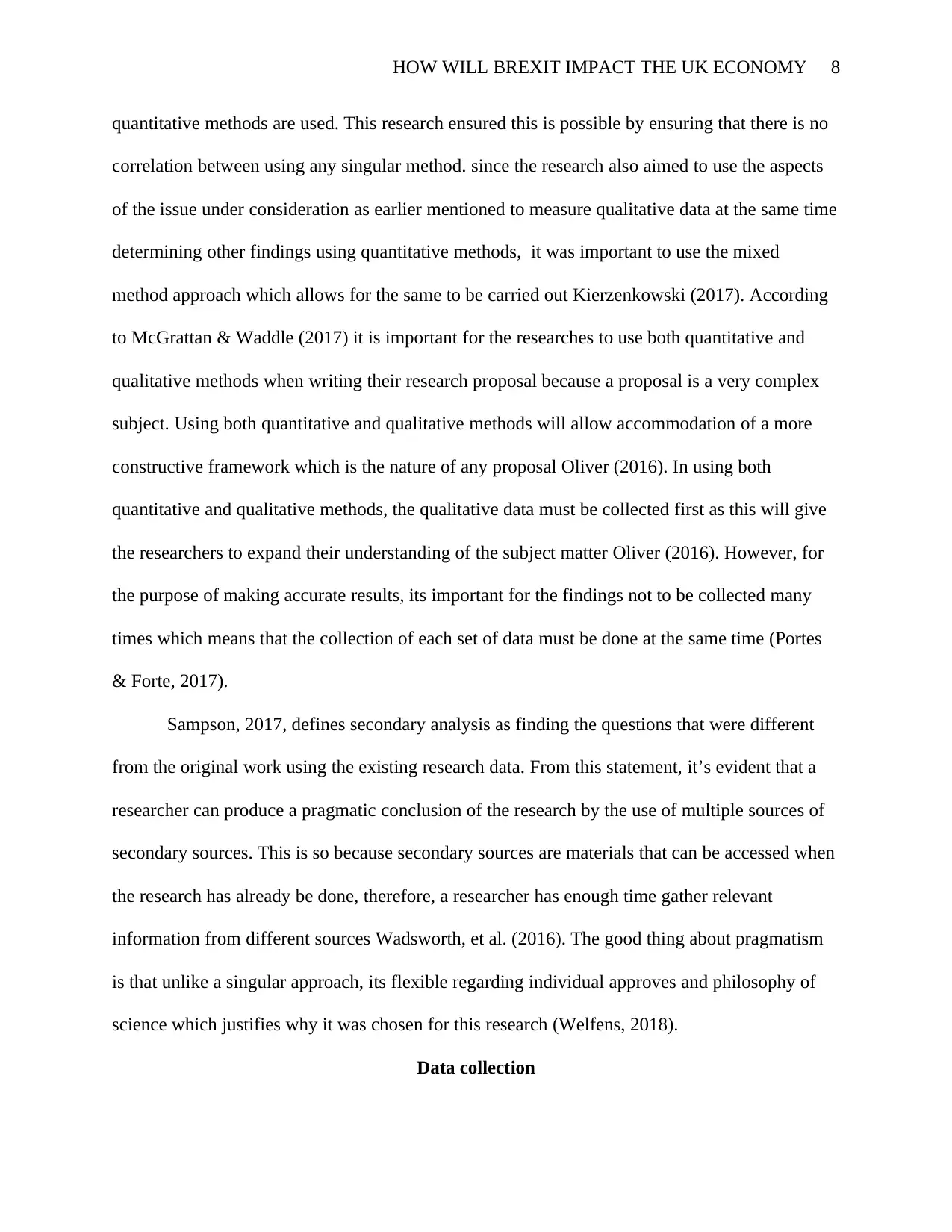
HOW WILL BREXIT IMPACT THE UK ECONOMY 8
quantitative methods are used. This research ensured this is possible by ensuring that there is no
correlation between using any singular method. since the research also aimed to use the aspects
of the issue under consideration as earlier mentioned to measure qualitative data at the same time
determining other findings using quantitative methods, it was important to use the mixed
method approach which allows for the same to be carried out Kierzenkowski (2017). According
to McGrattan & Waddle (2017) it is important for the researches to use both quantitative and
qualitative methods when writing their research proposal because a proposal is a very complex
subject. Using both quantitative and qualitative methods will allow accommodation of a more
constructive framework which is the nature of any proposal Oliver (2016). In using both
quantitative and qualitative methods, the qualitative data must be collected first as this will give
the researchers to expand their understanding of the subject matter Oliver (2016). However, for
the purpose of making accurate results, its important for the findings not to be collected many
times which means that the collection of each set of data must be done at the same time (Portes
& Forte, 2017).
Sampson, 2017, defines secondary analysis as finding the questions that were different
from the original work using the existing research data. From this statement, it’s evident that a
researcher can produce a pragmatic conclusion of the research by the use of multiple sources of
secondary sources. This is so because secondary sources are materials that can be accessed when
the research has already be done, therefore, a researcher has enough time gather relevant
information from different sources Wadsworth, et al. (2016). The good thing about pragmatism
is that unlike a singular approach, its flexible regarding individual approves and philosophy of
science which justifies why it was chosen for this research (Welfens, 2018).
Data collection
quantitative methods are used. This research ensured this is possible by ensuring that there is no
correlation between using any singular method. since the research also aimed to use the aspects
of the issue under consideration as earlier mentioned to measure qualitative data at the same time
determining other findings using quantitative methods, it was important to use the mixed
method approach which allows for the same to be carried out Kierzenkowski (2017). According
to McGrattan & Waddle (2017) it is important for the researches to use both quantitative and
qualitative methods when writing their research proposal because a proposal is a very complex
subject. Using both quantitative and qualitative methods will allow accommodation of a more
constructive framework which is the nature of any proposal Oliver (2016). In using both
quantitative and qualitative methods, the qualitative data must be collected first as this will give
the researchers to expand their understanding of the subject matter Oliver (2016). However, for
the purpose of making accurate results, its important for the findings not to be collected many
times which means that the collection of each set of data must be done at the same time (Portes
& Forte, 2017).
Sampson, 2017, defines secondary analysis as finding the questions that were different
from the original work using the existing research data. From this statement, it’s evident that a
researcher can produce a pragmatic conclusion of the research by the use of multiple sources of
secondary sources. This is so because secondary sources are materials that can be accessed when
the research has already be done, therefore, a researcher has enough time gather relevant
information from different sources Wadsworth, et al. (2016). The good thing about pragmatism
is that unlike a singular approach, its flexible regarding individual approves and philosophy of
science which justifies why it was chosen for this research (Welfens, 2018).
Data collection
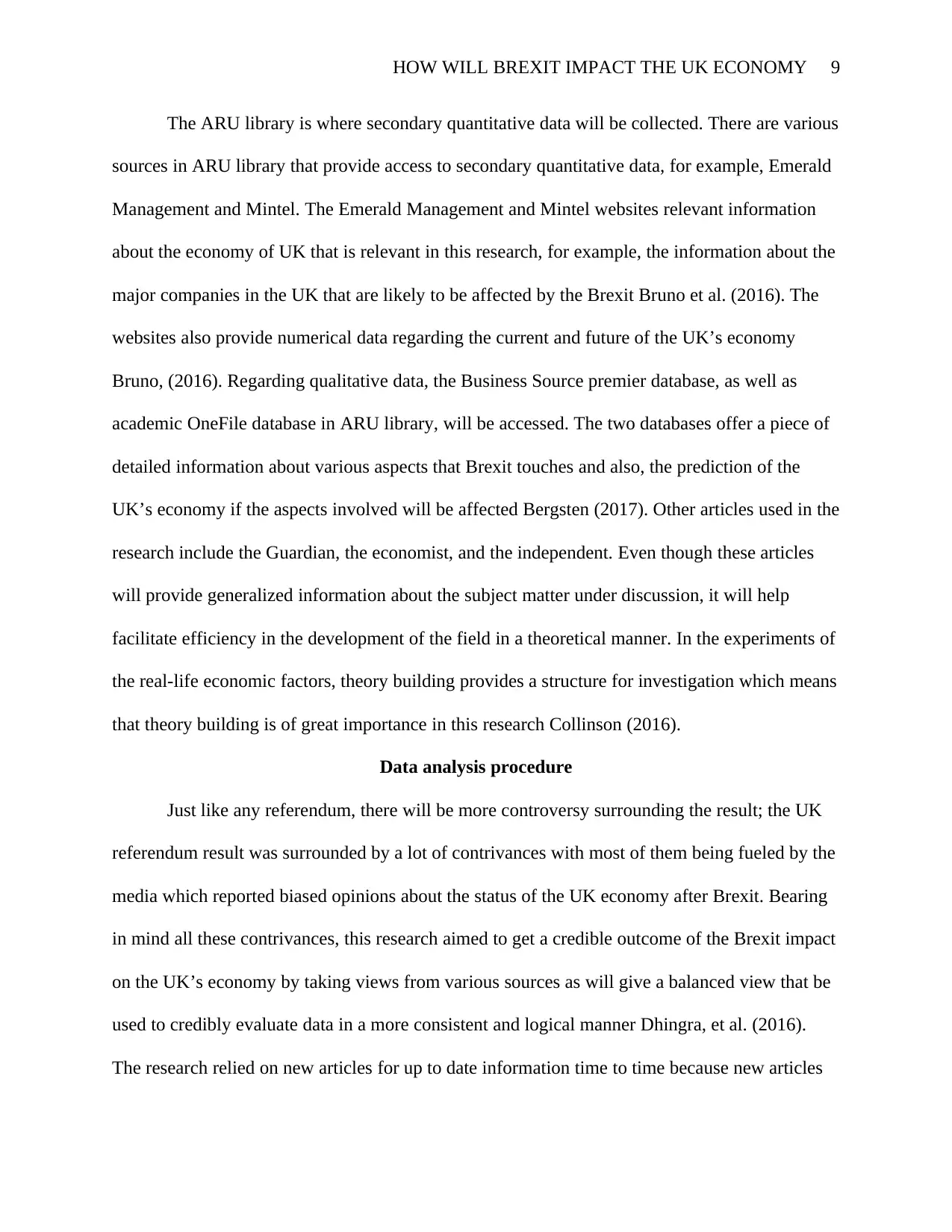
HOW WILL BREXIT IMPACT THE UK ECONOMY 9
The ARU library is where secondary quantitative data will be collected. There are various
sources in ARU library that provide access to secondary quantitative data, for example, Emerald
Management and Mintel. The Emerald Management and Mintel websites relevant information
about the economy of UK that is relevant in this research, for example, the information about the
major companies in the UK that are likely to be affected by the Brexit Bruno et al. (2016). The
websites also provide numerical data regarding the current and future of the UK’s economy
Bruno, (2016). Regarding qualitative data, the Business Source premier database, as well as
academic OneFile database in ARU library, will be accessed. The two databases offer a piece of
detailed information about various aspects that Brexit touches and also, the prediction of the
UK’s economy if the aspects involved will be affected Bergsten (2017). Other articles used in the
research include the Guardian, the economist, and the independent. Even though these articles
will provide generalized information about the subject matter under discussion, it will help
facilitate efficiency in the development of the field in a theoretical manner. In the experiments of
the real-life economic factors, theory building provides a structure for investigation which means
that theory building is of great importance in this research Collinson (2016).
Data analysis procedure
Just like any referendum, there will be more controversy surrounding the result; the UK
referendum result was surrounded by a lot of contrivances with most of them being fueled by the
media which reported biased opinions about the status of the UK economy after Brexit. Bearing
in mind all these contrivances, this research aimed to get a credible outcome of the Brexit impact
on the UK’s economy by taking views from various sources as will give a balanced view that be
used to credibly evaluate data in a more consistent and logical manner Dhingra, et al. (2016).
The research relied on new articles for up to date information time to time because new articles
The ARU library is where secondary quantitative data will be collected. There are various
sources in ARU library that provide access to secondary quantitative data, for example, Emerald
Management and Mintel. The Emerald Management and Mintel websites relevant information
about the economy of UK that is relevant in this research, for example, the information about the
major companies in the UK that are likely to be affected by the Brexit Bruno et al. (2016). The
websites also provide numerical data regarding the current and future of the UK’s economy
Bruno, (2016). Regarding qualitative data, the Business Source premier database, as well as
academic OneFile database in ARU library, will be accessed. The two databases offer a piece of
detailed information about various aspects that Brexit touches and also, the prediction of the
UK’s economy if the aspects involved will be affected Bergsten (2017). Other articles used in the
research include the Guardian, the economist, and the independent. Even though these articles
will provide generalized information about the subject matter under discussion, it will help
facilitate efficiency in the development of the field in a theoretical manner. In the experiments of
the real-life economic factors, theory building provides a structure for investigation which means
that theory building is of great importance in this research Collinson (2016).
Data analysis procedure
Just like any referendum, there will be more controversy surrounding the result; the UK
referendum result was surrounded by a lot of contrivances with most of them being fueled by the
media which reported biased opinions about the status of the UK economy after Brexit. Bearing
in mind all these contrivances, this research aimed to get a credible outcome of the Brexit impact
on the UK’s economy by taking views from various sources as will give a balanced view that be
used to credibly evaluate data in a more consistent and logical manner Dhingra, et al. (2016).
The research relied on new articles for up to date information time to time because new articles
⊘ This is a preview!⊘
Do you want full access?
Subscribe today to unlock all pages.

Trusted by 1+ million students worldwide
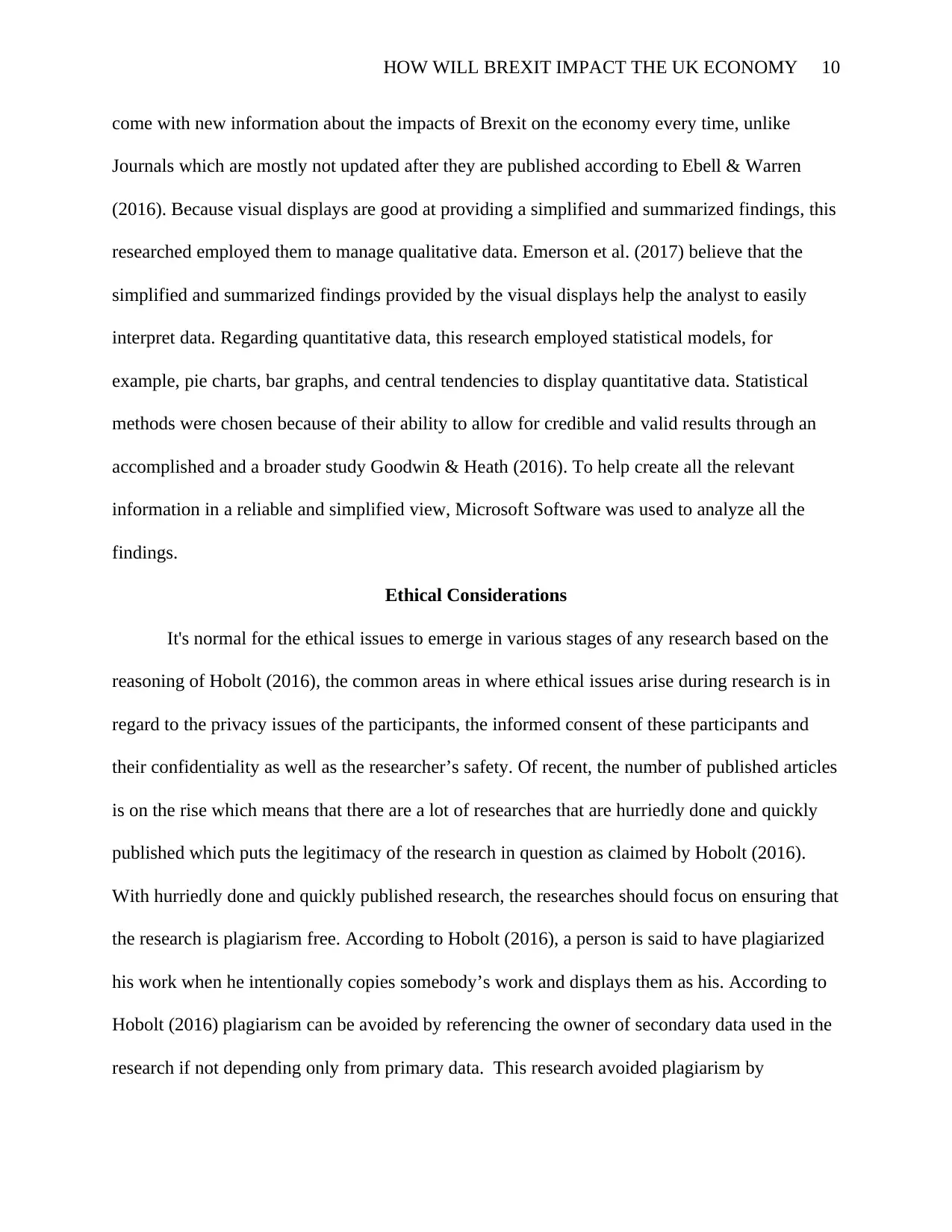
HOW WILL BREXIT IMPACT THE UK ECONOMY 10
come with new information about the impacts of Brexit on the economy every time, unlike
Journals which are mostly not updated after they are published according to Ebell & Warren
(2016). Because visual displays are good at providing a simplified and summarized findings, this
researched employed them to manage qualitative data. Emerson et al. (2017) believe that the
simplified and summarized findings provided by the visual displays help the analyst to easily
interpret data. Regarding quantitative data, this research employed statistical models, for
example, pie charts, bar graphs, and central tendencies to display quantitative data. Statistical
methods were chosen because of their ability to allow for credible and valid results through an
accomplished and a broader study Goodwin & Heath (2016). To help create all the relevant
information in a reliable and simplified view, Microsoft Software was used to analyze all the
findings.
Ethical Considerations
It's normal for the ethical issues to emerge in various stages of any research based on the
reasoning of Hobolt (2016), the common areas in where ethical issues arise during research is in
regard to the privacy issues of the participants, the informed consent of these participants and
their confidentiality as well as the researcher’s safety. Of recent, the number of published articles
is on the rise which means that there are a lot of researches that are hurriedly done and quickly
published which puts the legitimacy of the research in question as claimed by Hobolt (2016).
With hurriedly done and quickly published research, the researches should focus on ensuring that
the research is plagiarism free. According to Hobolt (2016), a person is said to have plagiarized
his work when he intentionally copies somebody’s work and displays them as his. According to
Hobolt (2016) plagiarism can be avoided by referencing the owner of secondary data used in the
research if not depending only from primary data. This research avoided plagiarism by
come with new information about the impacts of Brexit on the economy every time, unlike
Journals which are mostly not updated after they are published according to Ebell & Warren
(2016). Because visual displays are good at providing a simplified and summarized findings, this
researched employed them to manage qualitative data. Emerson et al. (2017) believe that the
simplified and summarized findings provided by the visual displays help the analyst to easily
interpret data. Regarding quantitative data, this research employed statistical models, for
example, pie charts, bar graphs, and central tendencies to display quantitative data. Statistical
methods were chosen because of their ability to allow for credible and valid results through an
accomplished and a broader study Goodwin & Heath (2016). To help create all the relevant
information in a reliable and simplified view, Microsoft Software was used to analyze all the
findings.
Ethical Considerations
It's normal for the ethical issues to emerge in various stages of any research based on the
reasoning of Hobolt (2016), the common areas in where ethical issues arise during research is in
regard to the privacy issues of the participants, the informed consent of these participants and
their confidentiality as well as the researcher’s safety. Of recent, the number of published articles
is on the rise which means that there are a lot of researches that are hurriedly done and quickly
published which puts the legitimacy of the research in question as claimed by Hobolt (2016).
With hurriedly done and quickly published research, the researches should focus on ensuring that
the research is plagiarism free. According to Hobolt (2016), a person is said to have plagiarized
his work when he intentionally copies somebody’s work and displays them as his. According to
Hobolt (2016) plagiarism can be avoided by referencing the owner of secondary data used in the
research if not depending only from primary data. This research avoided plagiarism by
Paraphrase This Document
Need a fresh take? Get an instant paraphrase of this document with our AI Paraphraser
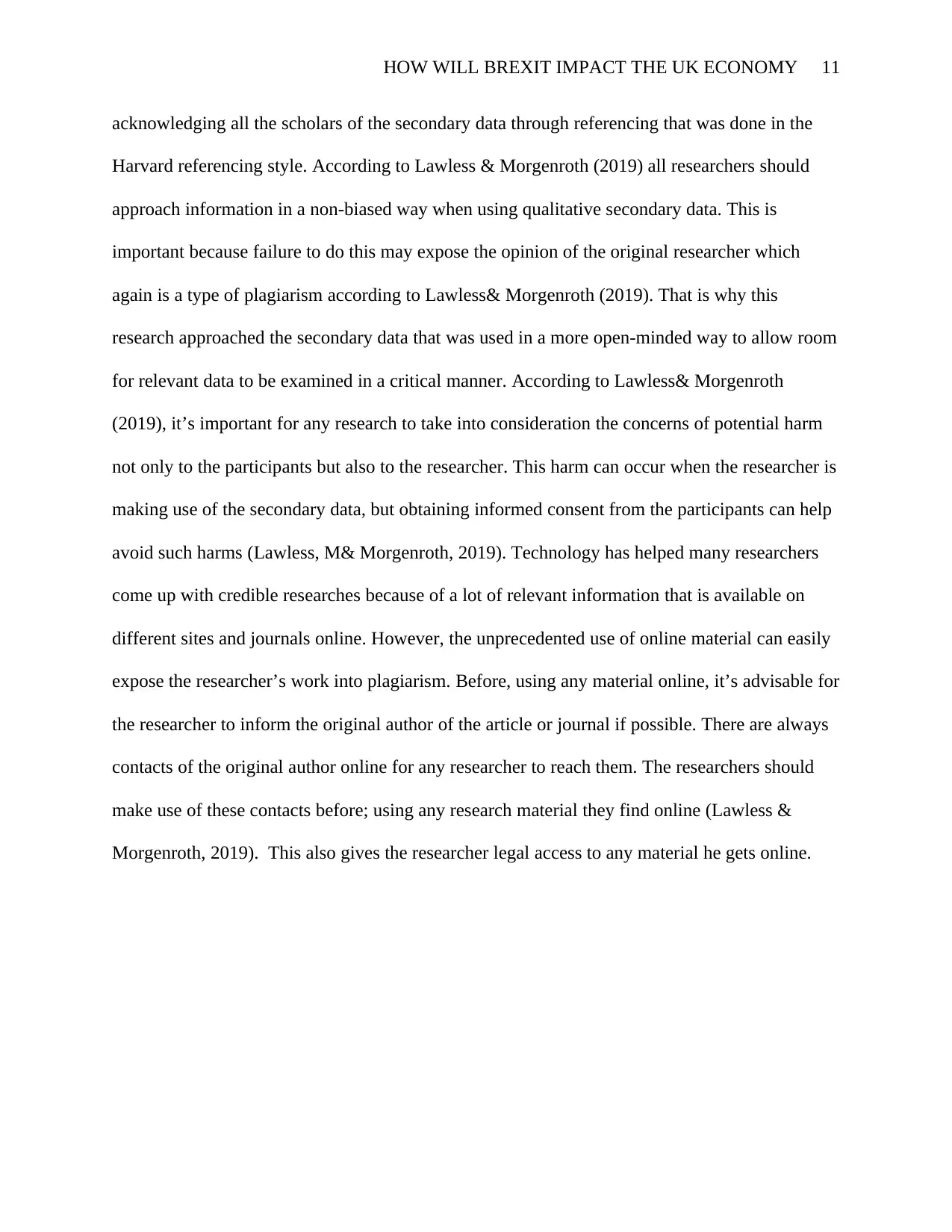
HOW WILL BREXIT IMPACT THE UK ECONOMY 11
acknowledging all the scholars of the secondary data through referencing that was done in the
Harvard referencing style. According to Lawless & Morgenroth (2019) all researchers should
approach information in a non-biased way when using qualitative secondary data. This is
important because failure to do this may expose the opinion of the original researcher which
again is a type of plagiarism according to Lawless& Morgenroth (2019). That is why this
research approached the secondary data that was used in a more open-minded way to allow room
for relevant data to be examined in a critical manner. According to Lawless& Morgenroth
(2019), it’s important for any research to take into consideration the concerns of potential harm
not only to the participants but also to the researcher. This harm can occur when the researcher is
making use of the secondary data, but obtaining informed consent from the participants can help
avoid such harms (Lawless, M& Morgenroth, 2019). Technology has helped many researchers
come up with credible researches because of a lot of relevant information that is available on
different sites and journals online. However, the unprecedented use of online material can easily
expose the researcher’s work into plagiarism. Before, using any material online, it’s advisable for
the researcher to inform the original author of the article or journal if possible. There are always
contacts of the original author online for any researcher to reach them. The researchers should
make use of these contacts before; using any research material they find online (Lawless &
Morgenroth, 2019). This also gives the researcher legal access to any material he gets online.
acknowledging all the scholars of the secondary data through referencing that was done in the
Harvard referencing style. According to Lawless & Morgenroth (2019) all researchers should
approach information in a non-biased way when using qualitative secondary data. This is
important because failure to do this may expose the opinion of the original researcher which
again is a type of plagiarism according to Lawless& Morgenroth (2019). That is why this
research approached the secondary data that was used in a more open-minded way to allow room
for relevant data to be examined in a critical manner. According to Lawless& Morgenroth
(2019), it’s important for any research to take into consideration the concerns of potential harm
not only to the participants but also to the researcher. This harm can occur when the researcher is
making use of the secondary data, but obtaining informed consent from the participants can help
avoid such harms (Lawless, M& Morgenroth, 2019). Technology has helped many researchers
come up with credible researches because of a lot of relevant information that is available on
different sites and journals online. However, the unprecedented use of online material can easily
expose the researcher’s work into plagiarism. Before, using any material online, it’s advisable for
the researcher to inform the original author of the article or journal if possible. There are always
contacts of the original author online for any researcher to reach them. The researchers should
make use of these contacts before; using any research material they find online (Lawless &
Morgenroth, 2019). This also gives the researcher legal access to any material he gets online.
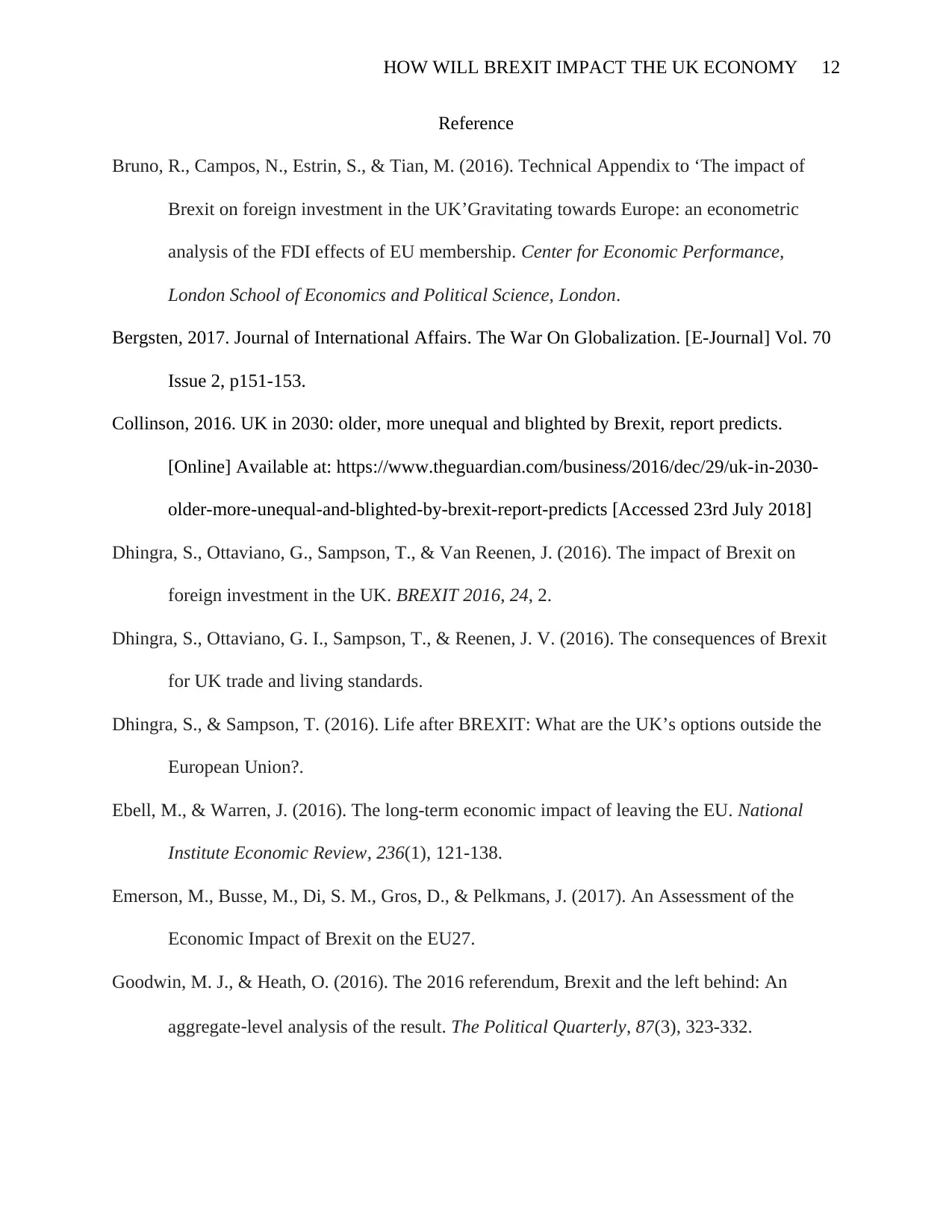
HOW WILL BREXIT IMPACT THE UK ECONOMY 12
Reference
Bruno, R., Campos, N., Estrin, S., & Tian, M. (2016). Technical Appendix to ‘The impact of
Brexit on foreign investment in the UK’Gravitating towards Europe: an econometric
analysis of the FDI effects of EU membership. Center for Economic Performance,
London School of Economics and Political Science, London.
Bergsten, 2017. Journal of International Affairs. The War On Globalization. [E-Journal] Vol. 70
Issue 2, p151-153.
Collinson, 2016. UK in 2030: older, more unequal and blighted by Brexit, report predicts.
[Online] Available at: https://www.theguardian.com/business/2016/dec/29/uk-in-2030-
older-more-unequal-and-blighted-by-brexit-report-predicts [Accessed 23rd July 2018]
Dhingra, S., Ottaviano, G., Sampson, T., & Van Reenen, J. (2016). The impact of Brexit on
foreign investment in the UK. BREXIT 2016, 24, 2.
Dhingra, S., Ottaviano, G. I., Sampson, T., & Reenen, J. V. (2016). The consequences of Brexit
for UK trade and living standards.
Dhingra, S., & Sampson, T. (2016). Life after BREXIT: What are the UK’s options outside the
European Union?.
Ebell, M., & Warren, J. (2016). The long-term economic impact of leaving the EU. National
Institute Economic Review, 236(1), 121-138.
Emerson, M., Busse, M., Di, S. M., Gros, D., & Pelkmans, J. (2017). An Assessment of the
Economic Impact of Brexit on the EU27.
Goodwin, M. J., & Heath, O. (2016). The 2016 referendum, Brexit and the left behind: An
aggregate‐level analysis of the result. The Political Quarterly, 87(3), 323-332.
Reference
Bruno, R., Campos, N., Estrin, S., & Tian, M. (2016). Technical Appendix to ‘The impact of
Brexit on foreign investment in the UK’Gravitating towards Europe: an econometric
analysis of the FDI effects of EU membership. Center for Economic Performance,
London School of Economics and Political Science, London.
Bergsten, 2017. Journal of International Affairs. The War On Globalization. [E-Journal] Vol. 70
Issue 2, p151-153.
Collinson, 2016. UK in 2030: older, more unequal and blighted by Brexit, report predicts.
[Online] Available at: https://www.theguardian.com/business/2016/dec/29/uk-in-2030-
older-more-unequal-and-blighted-by-brexit-report-predicts [Accessed 23rd July 2018]
Dhingra, S., Ottaviano, G., Sampson, T., & Van Reenen, J. (2016). The impact of Brexit on
foreign investment in the UK. BREXIT 2016, 24, 2.
Dhingra, S., Ottaviano, G. I., Sampson, T., & Reenen, J. V. (2016). The consequences of Brexit
for UK trade and living standards.
Dhingra, S., & Sampson, T. (2016). Life after BREXIT: What are the UK’s options outside the
European Union?.
Ebell, M., & Warren, J. (2016). The long-term economic impact of leaving the EU. National
Institute Economic Review, 236(1), 121-138.
Emerson, M., Busse, M., Di, S. M., Gros, D., & Pelkmans, J. (2017). An Assessment of the
Economic Impact of Brexit on the EU27.
Goodwin, M. J., & Heath, O. (2016). The 2016 referendum, Brexit and the left behind: An
aggregate‐level analysis of the result. The Political Quarterly, 87(3), 323-332.
⊘ This is a preview!⊘
Do you want full access?
Subscribe today to unlock all pages.

Trusted by 1+ million students worldwide
1 out of 13
Related Documents
Your All-in-One AI-Powered Toolkit for Academic Success.
+13062052269
info@desklib.com
Available 24*7 on WhatsApp / Email
![[object Object]](/_next/static/media/star-bottom.7253800d.svg)
Unlock your academic potential
Copyright © 2020–2026 A2Z Services. All Rights Reserved. Developed and managed by ZUCOL.





